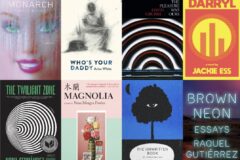Release Date: June 24, 2014
Label: Domino / Weird World
Having grown up loving both the introspective side of ‘90s R&B and the emo side of pop-punk, Tom Krell, aka How to Dress Well, wants to feel everything. He’s working on his PhD in philosophy, which means he also wants to think about it all as well. And although his electronic soul is gentle like his spirit, it’s volatile too: Krell’s lyrics collide and collapse and crisscross into each other like excited molecules in his combustible ballads. On his third album, “What Is This Heart?” (with quotation marks like Bowie’s “Heroes”), the Chicago-based singer-songwriter struggles to render his inner discord in musical terms, and the results are alternately captivating and frustrating.
As he’s stated in frank interviews, mental illness runs in his family, and his depression is palpable here. There’s lethargy in Krell’s minimalism: Several of his melodies would be stronger had they been more carefully composed and arranged rather than simply vamped or repeated. By working in near isolation with co-producer/mixer Rodaidh McDonald, Scottish secret weapon of the xx, Krell preserves the intimacy that – for both better and worse – makes his work so uncommonly personal. The album opens with the family drama “2 Years On (Shame Dream).” His brothers are in bed with these women; Mom feels as though she’s failed; Dad’s saying violent stuff, and Krell laments the absence of god. This stark, guitar-stroked scene starts the album as quietly as more conventional records finish, and the pain of it is obvious, but too many details cloud the plot. His ultimate point is unclear.
Much of the rest is likewise confessional to a fault, as if Krell’s fighting against clamming up by refusing to filter stuff his songs might be better off without. But “What You Wanted” doesn’t simply lust indiscriminately: Instead, it’s literally about the wayward nature of appetite. “You can never say just what you want without it wandering,” he concludes, but first he and Montreal’s CFCF combine slowly building jazz vibraphone, dancehall bass, and synths that suggest classical brass with the sensuality evocative of straightforward baby-making music. Yet the harmonies grow appropriately discordant; this is a song of existential crisis.
Krell works out his conflicts tenderly, rendering them with vocal chops that – despite indie’s continuing PBR&B trend – still don’t show up often in music this experimental. Maxwell and D’Angelo remain paragons for Krell, and the singer proves he’s closely studied their phrase-turning nuances. Sometimes his crooning is merely imitative, though, and his aesthetic too precious: With its piano arpeggio refrain and comparatively extroverted drum programming, “Repeat Pleasure” suggests dance-pop without ever cutting loose to become it: There are simply too many words, and they’re once again about desire’s vagaries. The catchiest track, “Precious Love,” grooves like a hit except for Krell’s inscrutable enunciation, and for the fact that it ends seconds after its cathartic key change. As much as he loves poppy soul, he still fears its lucidity.
Instrumental inventiveness helps him transcend his limitations. On “See You Fall,” he steps beyond contemporary R&B’s electronic textures for diaphanous chamber music that makes the lyrics’ malevolence all the more unsettling. “Pour Cyril” gets even more symphonic. Krell’s fragile vocal lacks finesse, but the strings couldn’t be grander: If Kanye West – another overt influence throughout – doesn’t sample their cathedral-filling riff soon, Drake probably will.
Although he may’ve started lo-fi with his homemade 2010 debut Love Remains, Krell’s now at the other, far more flattering end of the sonic spectrum. Like much of “What Is This Heart?”, “Words I Don’t Remember” isn’t terribly substantial song-wise: It’s essentially one simple keyboard riff that mutates in tone as the verses seek out a chorus that never arrives. But it’s a marvel of engineering; there are staccato guitars, stuttering vocal samples, gasps of air, falsetto trills, and siren wails that morph into climactic and strikingly satisfying blasts.
As intellectual and introverted as Krell often is, he’s at his best when he and the music simply let go. “What Is This Heart?” delivers in the second half when nearly every song peaks with exuberant finales. “I don’t have the power,” Krell laments over and over in “A Power,” the other CFCF collabo, but here amidst his newfound studio boldness he attains it. “I want to close my eyes knowing I saw this rock teeming with life and float off to the void at the top of the sky knowing just that I loved and lost in all directions and that I lived to the highest of the highest,” he cries in an unabashedly R. Kelly-as-emo moment. This grief-stricken, self-doubting, relentlessly analytical bookworm believes he can fly. And so, like his model, he does.





